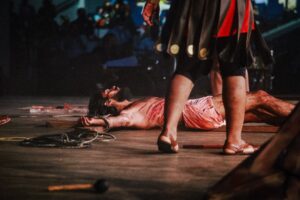
By Ken Yates
INTRODUCTION
Most of us participated in a play while we were in school. I remember one I was in that was about the founding of the United States. I don’t know what kind of play that would be called. I would call it a historical play. But I have been told that is not a proper category. Most plays are comedies or tragedies. In Mark 15:16-20, Mark describes a play. The reader will have to decide what kind of play it is.
A PLAY BY AMATEURS
Sometimes plays are put on by people trained to do so. We can go to places like New York City and see them. The actors and directors are professionals. They practice their lines. The costumes are fashioned specifically for the performance at hand. There are props and costumes that are made, fitting each character.
But we have also seen plays put on by amateurs. We have been a part of them. A few years ago, a famous one was put on by some U.S. soldiers at a place called Abu Ghraib. Some prisoners of war were dressed up in various costumes. They were used to put on a show for the soldiers who humiliated them. The soldiers definitely saw it as a comedy.
A similar show is put on in Mark 15:16-20.
A HASTILY PUT TOGETHER PLAY
In these verses in Mark, some men put on an impromptu performance. They also want to produce a comedy. There is a fairly large audience, probably around 200-300 spectators. Many of these spectators will actually take part in the play because they recognize the humor and want to contribute to it.
A play needs actors. While many of the men will act in the play, Jesus is the Star. He has just been convicted of being the King of the Jews; for anyone other than the emperor to be considered the ruler was considered an act of rebellion against Rome. In the eyes of these men, the fact that Jesus has been found guilty of being King of the Jews is hilarious in and of itself. It is absurd. The real king of the Jews is the most powerful man on earth, Caesar. When Jesus comes to them, He is a poor, itinerant rabbi who has just been brutally beaten by the Roman authorities. He is covered in blood. It would be hard to picture a man more unlike a king, more unlike Caesar. These men are Roman soldiers, and they lead Him into an open-air hall. This hall will become a theater stage as these men put on a show based upon what this Man is accused of. Even the very first sight of Him as He enters onto the stage would have brought laughter from all the spectators.
A play needs costumes. One of the soldiers then takes off a common Roman soldier’s coat and puts it on Jesus. It would have been worn out and probably dirty. But the coat is purple, and that is the color of royalty. This King needs a royal robe.
There also needs to be dialogue in this play. So, they provide it. If Caesar were to come, the soldiers would yell, “Hail, Caesar!” as an address of respect. Jesus needs to be addressed as well. So, they yell, “Hail, King of the Jews!” to the One on the stage. The picture is one of a stream of soldiers passing by this truly pathetic Figure, with each pretending to pay homage to Him. The comedy is so intense, many of the soldiers cannot say the words plainly as they pass by because they are laughing so hard.
There are also props in this play. A king needs a scepter, a symbol of his authority. In this comedy, this King is given one. It is a long leaf of a plant, and it is used to strike Him on the head. The King of the Jews also needs a crown, so they make a crown out of thorns and push it into His scalp, bringing more blood.
Those who are privileged to be in the presence of a king are sometimes given the honor of kissing him as a sign of respect. The soldiers, the subjects of this King, transform that honor into spitting on this King. Such action is a sign of great disrespect.
Finally, if Caesar were to visit these soldiers, they would make a sacrifice to the gods in his honor. After all, Caesar was like a god on earth and was worthy of their worship. These soldiers bow down before Jesus and feign worship of Him.
Even though the play was hastily thrown together, those involved were even able to put in a scene change. Five of those soldiers who took part in the play took the Star of the production to a hill a little way out of town. There, they hung Him on a cross and put a sign over His head, which declared in a hilarious way that He was the King of the Jews. This allowed many more spectators to enjoy the show.
One can almost imagine the laughter that came from this theater as this comedy was put on. Those in attendance would have gone home and told their family and friends of the show they saw. Many would have regretted that they were not present.
WHAT KIND OF PLAY WAS IT?
I don’t know how to classify the play I was in many years ago. In the same way, what would we call this play in Mark 15? Certainly, it wasn’t a comedy, even though the spectators thought that is what they were seeing. As believers, would we call it a tragedy because it eventually resulted in the biggest crime in the history of the world?
It is hard to think of it in those terms because this “crime” provided the payment for the sin of the world. This would make possible the gift of eternal life for all who believe in Christ for that gift. For those of us who have received this gift, we are grateful for what happened and praise God for it.
I have been told that another category of plays deals with irony. Is that what this play is in Mark 15, because the spectators don’t realize that this really is the King of the Jews, and the joke was on them?
I simply don’t know what to call the play these soldiers put on. I know that there was nothing funny about it. I look at that stage and see my Savior and King put Himself through that humiliation for me. In fact, He did it for us all.

WE ALSO ARE CALLED TO BE ACTORS
It is important for us to study the play we see in Mark 15. The reason is that we are told to become actors in a similar one. The author of Hebrews tells his readers that they have already been put on a stage in front of people who laughed at them for their faith. Like Christ, they too suffered as a result of that humiliation (Heb 10:32-34). Their suffering was a source of entertainment for those who watched the stage.
The NT teaches that believers are called to follow in the footsteps of the Lord. If He was put in front of the world for ridicule and to become the butt of their jokes, faithful believers can expect the same.
And it wasn’t just for the original readers of Hebrews. Later, the author will say for all believing readers of the book to follow Christ while “bearing His reproach” (Heb 13:13). He was the leading actor of the show put on in front of the world, but we are called to be the supporting cast.
CONCLUSION
We might not know the proper classification of the play described in Mark 15. It causes us to have a mixture of sadness and gratefulness when we watch it on the pages of the NT.
But isn’t it wonderful that we can take part in it in some small way? I have sometimes heard of lesser-known actors describe the thrill they experienced when they got to share the stage with a legend such as Marlon Brando. Think of the privilege that we have. The Lord calls every believer to suffer with Him. When we do, before the eyes of the world that mocked and rejected Him, we get to step on the stage with Him.
_______________________
Ken Yates retired as a Lt. Col. from the Army after 20 years as a chaplain. He and his wife, Pam, live in Columbia, SC, but will soon move to Indianapolis to be near their grandkids. Ken leads the GES international team.

